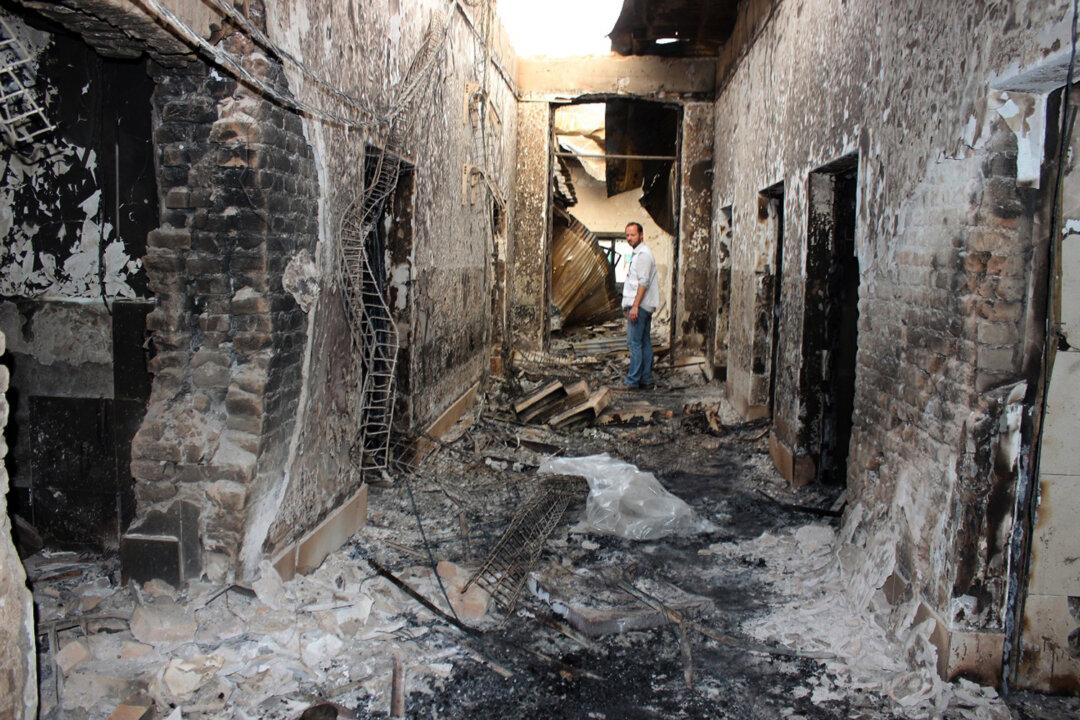BEIRUT—The first missile slammed into the field hospital in the rebel-held Syrian town of Sarmeen, killing a physiotherapist inside. Five minutes later, the aircraft returned, firing another missile that hit nearby just as the first responders were arriving. A total of 13 were killed, and the hospital organizers blamed Russian warplanes.
In Yemen, airstrikes by a Saudi-led coalition targeting rebels destroyed a hospital run by the international medical charity Doctors Without Borders this week. Although there were no deaths, the hospital was the latest casualty of a campaign that has claimed the lives of nearly 3,000 people since March.
But those strikes on hospitals brought little international outcry — a sharp contrast to an Oct. 3 American strike on a hospital in Afghanistan that killed 30 people and brought a firestorm of criticism on Washington.
The reasons are many, perhaps chief among them is general fatigue over the conflicts in Syria, now in its fifth year, and in Yemen, a relatively impoverished and isolated country mired in turmoil for more than a decade. Also, while the U.S. acknowledged relatively quickly that it carried out the strikes and President Barack Obama apologized to Doctors Without Borders, which also ran that facility, Russia and Saudi Arabia categorically deny that their campaigns hit civilians, and conditions on the ground make confirmations more difficult, muddying the waters for critics. Russia denied it hit the Sarmeen hospital, which was struck Oct. 20.
“After more than four years of war, I remain flabbergasted at how international humanitarian law can be so easily flouted by all parties to this conflict,” said Sylvain Groulx, head of Doctors Without Borders’ mission for Syria. “We can only wonder whether this concept is dead.”
The Syrian conflict has killed a quarter of a million people, producing a seemingly endless churn of death and devastation to viewers around the world. Hundreds of medical facilities have been destroyed throughout the war and 670 medical personnel have died since the start of the conflict in March 2011, according to Physicians for Human Rights.
The war in Yemen has generated little attention. There, Saudi Arabia and its allies have been waging an air campaign since March to back the president, ousted by Shiite rebels who have taken over large parts of the country. Civilian areas have borne a large part of the violence, and the U.N. said the Doctors Without Borders hospital hit Monday was the 39th health center struck in the air campaign.
Few governments around the world are eager to vocally criticize oil powerhouse Saudi Arabia, since many benefit from its aid or investment. Saudi Arabia has also been able to win support for its campaign — even from the U.S. — by presenting it as aimed at pushing back the influence of Iran, which backs the rebels. For example, in Egypt, which is officially a partner in the Saudi coalition, little coverage of the Yemen war appears on TV stations and what does appear is uncritical.
“The media silence, coupled with a general lack of knowledge of Yemen and a growing anti-Shiite sentiment in the country, fuels the apathy toward the war,” said Egyptian analyst and sociologist Ziad A. Akl.
The relative silence over the civilian death toll in Yemen is in contrast, some say, to the outcry over Israel’s successive wars with the Palestinians in Gaza.
Israel was criticized over the heavy civilian death toll during last year’s war, when over 2,200 Palestinians were killed, including more than 1,400 civilians, according to the United Nations. Israel has said the civilian death toll was lower and blamed Hamas for civilian deaths, saying the group used schools, hospitals, mosques and residential areas as cover to stage attacks. The government often complains it is held to a double standard and comes under greater scrutiny than other nations.





